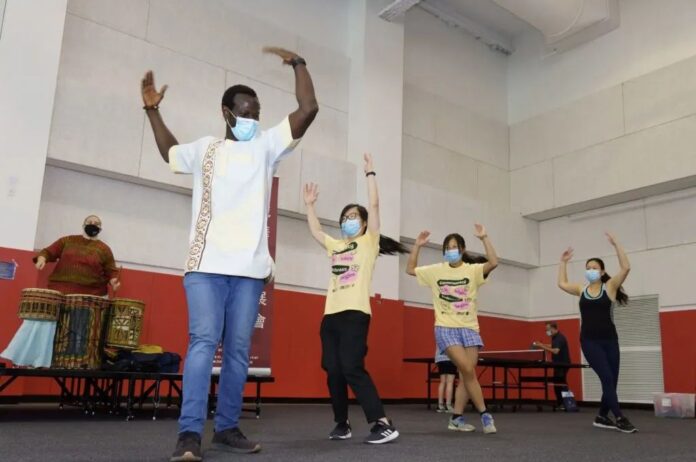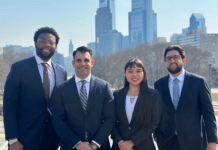编者案:本文是九篇系列报道的第八篇。这个系列报道旨在让读者有机会更多了解费城地区不同亚裔社群,关注他们的历史,影响力和面对的挑战。现在,我们比以往任何时候都更需要为亚洲发声。
这一系列报道是新主流传媒公司与费城华埠发展会(PCDC)合作,和Sojourner Consulting协同,并获得独立公共媒体基金会(the Independence Public Media Foundation)的大力支持。
This article is the eighth of a series of nine stories which seeks to increase visibility and understanding of the diverse Asian American communities in the Philadelphia region and their strengths, challenges and histories. Now more than ever, we must ensure Asian voices have a platform to speak out against the issues impacting our communities.
This series is developed by New Mainstream Press in partnership with the Philadelphia Chinatown Development Corporation and in consultation with Sojourner Consulting, with support from the Independence Public Media Foundation.
海华都市报专访
Reporter:Bei Li 记者编辑:李 蓓
罗方妤是一名讲中文的心理咨询师。就在上个星期,她接到了一个求助电话。电话那头是一位年轻男子,焦急地向她诉说了自己在工作中遭遇。原来,这个年轻人通过层层面试,在费城某公司找到了一个满意的工作。这本来是一件高兴的事,但是在上班的第一天,他的新同事就一直在问他是否是华人,追问他对“中国病毒”的看法。这让他陷入了焦虑,担心自己不能通过试用期,然后失去这份工作。
Felicia Luo is a Chinese speaking psychotherapist. Last week, she received a call for help. At the other end of the phone was a young man who anxiously told her about his experiences at work. The young man had recently found a job in Philadelphia. On his first day at work, a new colleague kept asking him whether he was Chinese, and pressed him for his thoughts about “China virus.” This made him feel uncomfortable. He worried that he would not pass the probation period and lose his job if he did not conform to his colleagues’ pre-conceived views.
因为保护病人的隐私,罗医生并没有向我们透露更多的细节,但是在她所接触到,需要心理帮助的华裔患者中,虽然大家经历各有不同,在新冠疫情之后,种族歧视都是一个绕不开的话题。
Felicia did not disclose additional details due to HIPPA confidentiality. However, among Chinese patients who come to her seeking psychological help, after the COVID-19 pandemic, racial discrimination and anxiety is an unavoidable topic.
很长时间以来,美国华裔族群的心理健康问题并没有得到足够的重视。2020年,新冠肺炎大流行导致的仇外心理和偏见升级到令人震惊的程度。亚裔族群遭到的歧视和偏见,不仅造成了物理性的伤害,更多的伤害表现在心理层面。不过并不是所有的人都能正视自己受到的伤害,找到心理医生和参加社区活动寻求帮助。很多受害者心理健康状况未有改善,受伤的心灵还在滴血。
Asian Americans and Pacific Islanders (AAPI) are experiencing unprecedented and growing health inequity issues brought on by the COVID-19 pandemic and anti-AAPI hate. The discrimination and prejudice against the AAPI community causes not only physical harm, but also psychological damage. However, not everyone can find therapists or psychologists or participate in community activities to seek help. Overall mental health of many victims has not improved.
本文试图希望通过采访和记者的观察,探究亚裔群体心理健康管理的现状,帮助亚裔群体提高对心理健康的重视,并为大家提供一些实用信息,为需要帮助的人提供一个情绪出口。
We attempted to explore the state of AAPI mental health through interviews and reporters’ observation with the goal of helping members of the community become self-aware of mental health.
“中国病毒”阴影下,仇恨和歧视引发更多亚太裔心理问题
Under the shadow of the “China virus,” hatred and discrimination lead to more AAPI psychological problems.
2021年5月,总部设在旧金山的“反亚裔仇恨联盟”发布了《停止AAPI仇恨心理健康报告》(STOP AAPI HATE MENTAL HEALTH REPORT)。报告中提到美国亚太裔族群正经历着由新冠大流行和“Anti AAPI Hate”带来的前所未有,且日益严重的心理健康失衡问题。
In May 2021, the non-profit organization “Stop AAPI Hate,” headquartered in San Francisco, released the STOP AAPI HATE MENTAL HEALTH REPORT. The report states that AAPI individuals are experiencing unprecedented and growing health inequity issues brought on by the COVID-19 pandemic and anti-AAPI hate.
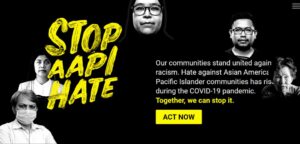
图片来源:stopaapihate官网
Photo credits to stopaapihate official website
就像1965年推行的系统性地禁止亚洲移民的排他性移民政策,针对亚裔美国人的种族主义在美国历史上并不罕见。近几年,中美关系的“敌对”和有关新冠病毒的煽动性政治言论,例如,称新冠病毒为“中国病毒”,更加剧了对亚裔美国人的种族主义。
While racism targeting Asian Americans is not new to the U.S.—with exclusionary immigration policies that systemically barred immigration from Asia for decades—the contemporary antagonistic U.S.-China relations and inflammatory and demeaning rhetoric about the COVID-19 (e.g., “China virus” and “Kung flu”) exacerbated racism this community.
亚裔美国人正经历着前所未有的心理健康问题,包括焦虑、抑郁和创伤后应激障碍(PTSD)症状加剧。这些挑战使亚裔美国人面临更大的长期身心健康风险。
Asian Americans who have experienced racism have heightened symptoms of depression, anxiety, stress. Experiencing racism during COVID-19 is found to be more strongly associated with Post Traumatic Stress Disorder (PTSD) symptoms.
根据对数千名亚裔美国的调查,《停止AAPI仇恨心理健康报告》发现,种族主义给亚裔美国人带来的压力比新冠疫情本身还大。经历过种族主义的亚裔美国人,有五分之一会表现出种族创伤,即种族主义造成的心理和情感伤害。
Asian Americans who have experienced racism are more affected by anti-Asian hate than the pandemic itself. A full 20% of Asian Americans who have experienced racism display racial trauma, the psychological and emotional harm caused by racism.
针对日益增长的亚裔心理健康服务需求,2021年4月,心理医师罗方妤所在的芒果树心理健康咨询中心(Mango Tree Counseling and Consulting)开业。这个中心配置了包括汉语普通话,粤语,越南语,韩文,菲律宾语和印度语等语种的心理医师,是大费城地区唯一一家专门为亚太裔族群提供心理咨询服务的机构。
In response to the growing demand for AAPI mental health services, in April 2021, the Mango Tree Counseling & Consulting (MTCC). MTCC, where psychotherapist Felicia Luo practices, is the only organization in Greater Philadelphia that provides psychological counseling services targeting the AAPI community. They are equipped with therapists who speak Mandarin Chinese, Cantonese, Vietnamese, Korean, Filipino, and Hindi.
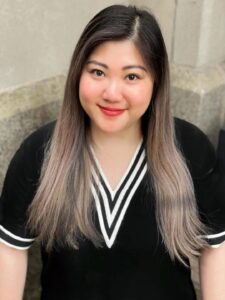
罗方妤,心理咨询师 图片由本人提供
Felicia Luo, psychotherapist,Personal photo
关于种族主义为亚裔群体带来的心理伤害,罗方妤回忆起去年11月,费城地铁发生华裔女中学生被打事件之后,有一位高中女生找到了她。这个女生她虽然和被殴打的学生不在同所学校,但是地铁上的种族暴力事件发生后,尤其是在看到了在网络间广泛流传的暴力视频之后,她非常恐慌,不能自拔,甚至发展到不敢上街,坐地铁,不敢去上学的地步。
Felicia recalled that in November of 2021, a high school girl came to her practice after a group of Chinese American high school students were viciously beaten on the Philadelphia subway. The attack was unprovoked. It started when another group of students hurled racist insults at the Chinese American students before quickly escalating into a brutal physical assault. Although Felicia’s patient is not in the same school as the students who were beaten, after seeing the widely circulated video, she suffered from panic attacks. She dare not take the subway, venture outside, or go to school.
“在现在的情况下,对病患说,你看开点儿,事情都会过去,这非常不实际。因为种族主义造成的心理和情感伤害是深层次的,在长时间内可能都无法排解,有的甚至还在代际之间互相影响和更难去排解。”罗医生回忆说,“我和她聊了很多,包括怎样去看待和解读这个攻击,我也会跟着她一起去感受这个悲伤,或者是去认同她的情绪。我还要告诉她,‘很多时候,我们不能控制恶性事件的发生,但是你有权力去生气,去悲伤,所有的负面情绪都是合理的,可以被认同的。’”
“It is very hard to say to patients that if you look on the bright side, everything will be fine. Because the psychological and emotional damage caused by racism is deep-seated, it may not be resolved for a long time, and some even affect each other between generations and are more difficult to resolve.” Felicia recalled, “I talked with the girl a lot, including how to look upon the attack. I also followed her to feel the sadness and identify with her emotions, telling her, ‘we can’t control the occurrence of malignant events, but you have the right to be angry and sad. All negative emotions are reasonable and can be recognized.'”
“模范族裔”幻影中,亚裔美国人心理健康堪忧
Mental Health of Asian-Americans in the “Model Minority” Illusion
其实,亚裔美国人的心理健康问题由来已久。文化冲突,家庭矛盾,代际关系,种族歧视和暴力,移民环境不适等等问题,是“种”在很多亚裔美国人心中的“杂草”。由于心理问题引发了自杀等恶性事件,也常见诸于报端。
Asian Americans have a long history of mental health problems. Cultural conflicts, family conflicts, intergenerational relations, racial discrimination and violence, and the discomfort of the immigrant environment are “weeds” in the hearts of many Asian Americans. Fueled by detrimental psychological effects, suicide and self-harm are all too common.
在亚裔族群中,很多青少年受到心理健康问题的困扰。在传统的华人文化中,有别于其它文化的特点之一就是父母对孩子有很高的期望,“望子成龙”。父母过高的期望成了亚裔孩子生命中不可承受之重。在学校和社会中,他们是“美国人”;但是回到家,和父母或者长辈相处时,他们又被笼罩在亚洲文化和观念中。美国的社会文化和父母的传统观念之间的冲突,让很多孩子想不通。
In the Asian American community, many teenagers are troubled by mental health problems. In traditional Chinese culture, one of the characteristics different from other cultures is that parents have high expectations for their children and “hope that their children succeed.” Parents’ high expectations have become an unbearable burden in the lives of Asian children. In school and society, they are “Americans.” But when they return home, they are shrouded in Asian culture and concepts. The conflict between American social culture and parents’ traditional concepts makes many children confused.
老年人是另一个饱受心理问题困扰的亚裔群体。很多长辈不会说英语,又早已过了学习语言的年龄。语言的障碍使他们无法与外界沟通。还有很多老人跟随子女搬到美国之后,发现美国的生活和他们想象中的完全不同。不仅生活不容易,而且因为语言不通,身边没有朋友,老年人中患抑郁症状的比例很高。
Another Asian group suffering from psychological problems is the elderly. Many seniors can’t speak English. Language barriers prevent them from communicating with the outside world. Many of them have found that life in the U.S. is completely different from what they imagined after they moved here with their children. The proportion of elderly people suffering from depression is high because of the language barrier and a lack of an independent social network. These feelings become heightened after their children move out of the house. A sense of isolation often grows.
另外一个需要关注的群体是亚裔女性。她们的压力主要来自现实生活和预期中的差距,以及来美国后因为家庭角色的转换而引起的婚姻问题,家庭暴力也成为威胁亚裔女性心理健康的凶手。
Asian American women is another subgroup of particular concern. Their pressure mainly comes from the gap between real life and expectations, as well as marital problems caused by changing family roles after immigrating to the U.S. Domestic violence also has devastating physical and emotional effects on many Asian women, and on some Asian men.
虽然饱受心理问题的困扰,与其他种族和族裔群体相比,亚裔美国人却表现出较低的心理健康治疗利用率,通俗地说,在感觉自己的情绪和心理出现问题的时候,很多亚裔美国人并没有通过寻求心理医师或者其他途径,主动寻求治疗和解决,而且选择忽视。记者通过调查和走访,发现其中几个主要原因。
Although Asian Americans suffer a disproportionate rate of psychological problems, Asian Americans have a lower rate of mental health treatment. When faced with emotional problems, many Asian Americans do not actively seek treatment and simply ignore these feelings. Through investigation and interview, we found several reasons.
1966年,《纽约时报》发表了美国社会学家威廉姆·皮特森的一篇关于亚裔美国人成功故事的文章,其中首次将辛勤工作并重视家庭观念的美国亚裔称为“模范族裔”。在随后的几十年中,这个标签成为亚裔生活中挥之不去的烙印。
In 1966, the New York Times published an article on the success story of Asian Americans by William Peterson, an American sociologist. The article bestowed the label “Model Minority” on Asian Americans who worked hard and valued family relationships. In the following decades, the “Model Minority” sobriquet has become inextricably linked to Asian Americans.
然而,人们对于亚裔的这一刻板印象不仅掩饰了大多数亚裔平凡抑或艰辛的生活状况,更使得他们因为无法达到这些不切实际的社会期望而陷入极度痛苦的精神压力之中,而且会把自己定义为“不需要额外帮助或关注的顺从群体”。“模范族裔”神话是个假象,让亚裔群体习惯于做沉默的羔羊,习惯于隐藏痛苦,默不作声。
However, the “Model Minority” myth not only covers up the ordinary or difficult living conditions of most Asian Americans, but also makes Asian Americans experience unhealthy pressure because they cannot meet such unrealistic economic and social expectations. Furthermore, many are externally defined, and may self-define, as “an obedient group that does not need additional help or attention.” The illusion conditions Asian American to suffer in silence.
记者在走访时发现,在很多亚裔美国人眼中,心理健康的话题都是一个禁区。很多人认为被别人称为“心理有病”,是一件非常耻辱的事情。美国社会将心理健康等同于精神疾病的倾向也让华裔美国人社区在谈论它时感到不适。
During our interviews, we found that for many Asian Americans, mental health is a forbidden topic. Many people think that mental illness is shameful. The tendency of American society to equate mental health with mental illness also makes the Chinese American community feel uncomfortable when talking about it.
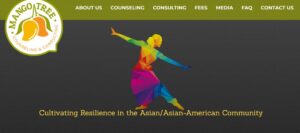
图片来源: MTCC官网
Photo credits to MTCC official website
尽管亚裔对心理健康服务的需求很大,但是在美国能提供行为健康与心理健康关怀的亚裔心理医师并不多。记者曾经在网络间尝试寻找大费诚地区的华人心理医师,搜到的结果寥寥无几,打电话过去咨询,很多医生都是满负荷状态,不能再增加新的病人,只能在”Waiting List”上等待。
Although Asian Americans have great need for mental health services, there are not many psychologists with Asian background who can provide behavioral health and mental health care in the U.S. We once tried to find Chinese psychiatrists in the great Philadelphia area on the Internet. The results we found were few and far between. Many doctors were at full capacity and could not add new patients.
华人医师难找,找到白人心理医师却会因为语言障碍或文化隔阂沟通不畅,甚至发生误诊的情况。罗方妤医师表示,她的很多病人,之前都是找白人心理师做咨询和治疗,“我们知道种族与心理医师的水平无关,但是即使语言没有问题,他们有时间在文化上还是听不懂的。在很多讲家庭,很多心理层面的问题,其他种族的心理医生,他们可能会‘下错药’。他们的反馈可能没有文化认同。他们留的“功课”在亚裔家庭中是无法完成的。”“相比之下,看华人心理医生的时候,至少心理医生会知道病患的背景,不需要解释给他们听。交流和沟通上会好很多。来咨询的人感到的自己是被“听到”和“懂得”的。
Chinese psychologists are hard to find. Finding a white psychiatrist may lead to poor communication and even misdiagnosis due to language or cultural barriers. Felicia said that many of her patients had previously sought counseling and treatment from white psychologists. ” We know that success in therapy is not race determinant, but they still cannot understand culturally, even if there is no language problem, Clinicians of different races might ‘prescribe the wrong medicine.’ And the ‘homework’ they leave cannot be done. In contrast, when seeing a Chinese therapist, at least they will know the background of the patient and do not need to explain it to them. Those who come to the consultation feel that they are ‘heard’ and ‘understood.’”
高额的费用也是低收入亚裔群体接受心理治疗的绊脚石之一。通常,单次心理治疗的费用在100-300美元之间。即使对于有医疗保险的人来说,治疗费用通常也只在你达到最大免赔额后才被由医疗保险来支付。
High cost is also one of the stumbling blocks for Asian Americans to receive psychological treatment if they are low or moderate income and lack of health insurance . The cost of a single session can be anywhere from $100-300. Even for people with health insurance, therapy is often only covered once they have reached the max deductible.
积极改变现状,心若向阳, 必生温暖
Actively Change the Status Quo and the Future Will be Better
为了给亚裔美国人提供更好的心理健康服务资源尼尔·拉米雷斯和几个年轻人在2021年4月,成立了关注于为AAPI群体芒果树心理咨询机构(MTCC)。目前,他们拥有11位通晓亚洲本土语言的心理医师,为不同母语的病患提供服务。
To provide better mental health service resources for Asian Americans, Noel Ramirez and several young people established the Mango Tree Counseling & Consulting (MTCC) focused on serving the AAPI group in April 2021. Currently, they have 11 psychotherapists who are proficient in native Asian languages, serving patients with different native languages.
这种力量的集合不仅让机构有更明确的服务目标,而且可以通过对相关的培训,为亚太族裔提供更多的心理治疗师。
This collection of strengths not only allows institutions to have clearer goals, but also provides more psychotherapists to Asian Pacific communities through relevant training.
MTCC这样的心理咨询机构集合了亚裔心理医生的力量为大家服务,同时通过病例的研究和培训,培养更多关注于亚太裔社区心理治疗师。除了一对一的心理咨询服务,每周一和周四,MTCC还会针对不同的议题,举行心理师和公众共同参与的线上讨论会。
Through case research and training, MTCC also cultivates more therapists who focus on the Asian Pacific community. In addition to one-on-one psychological counseling services, every Monday and Thursday, MTCC holds online discussions on different topics with the participation of psychologists and the public.
与此同时,针对青少年面临的影响心理健康的各种压力,MTCC还推出了一项叫“Ginger Root”的计划,为宾州亚太裔学生提供简短的行为健康咨询、压力管理和行为健康指导。
At the same time, MTCC also launched a program called “Ginger Root” in response to the various pressures that teens face affecting their mental health, which provides short behavioral health counseling, stress management, and behavioral health coaching for AAPI students in Pennsylvania.
今年4月,一个费城非洲裔和亚裔团结活动在费城华埠发展会举行。这既是对2021 年11月针对四名亚裔美国青少年的SEPTA袭击的具体回应,也是对非洲裔和亚裔社区之间种族紧张关系因疫情总体加剧的解决方案。
In April of this year, a Philadelphia African American and Asian American Solidarity Event was held at the Philadelphia Chinatown Development Corporation. This is both a specific response to the November 2021 SEPTA attack on four Asian American teens, and a solution to the overall heightened racial tensions between the African American and Asian American communities due to the pandemic.
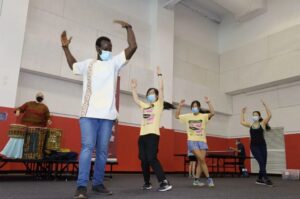
图片来源:the Inquirer
Photo credits to the Inquirer
活动组织者卡斯蒂略(Esther Hio Tong Castillo)表示,当种族暴力事情发生时,它非常容易引发二次心理创伤,所以我们开始围绕非裔和亚裔的理解和互信做一个心理疏导和建设的工作。
The organizer of the event, Esther Hio Tong Castillo, said that when racial violence occurs, it is very easy to cause secondary psychological trauma, so we began to do a psychological counseling and construction around the understanding and mutual trust of Africans and Asians work.
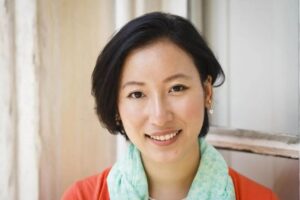
Esther Hio-Tong Castillo博士 移民家庭情绪健康项目负责人,图片由本人提供
Esther Hio-Tong Castillo, PhD, Founder and Program Director at CIFWI,Personal photo
这项活动从属于“中国移民家庭健康倡议”(CIFWI)项目。该项目由前美国科学社会学教授、后来成为社区组织者的卡斯蒂略于2020年创建。MTCC也是这个项目的积极参与者。
This program is a part of the Chinese Immigrant Family Wellness Initiative (CIFWI) project. The project was created in 2020 by Esther Hio Tong Castillo, a former American sociology of science professor turned community organizer. MTCC is also an active member in this project.
37岁的卡斯蒂略是CIFWI的项目总监,负责为移民家长及其子女实施和组织项目和研讨会。该组织致力于为华人青年提供谈论心理健康的工具,同时也为华裔老年人提供服务,因为他们相比之下,更难接触到心理健康方面的内容。
Castillo, 37, is CIFWI’s program director, implementing and organizing programs and workshops for immigrant parents and their children. The group works to provide Chinese youth with tools to talk about mental health, as well as catering to Chinese American seniors, who also have difficulty accessing to mental health resources.
该项目在和“老华人”一起探讨家庭压力、代际沟通以及自我照顾等问题的同时,派生出一个向所有亚洲家庭开放的新项目:“青年领导力计划”(Youth Leadership Program)。这个项目有华裔,柬埔寨裔、越南裔和菲律宾裔的青年人参与,由心理健康专业人士和不同背景的亚裔年轻人们共同探讨种族,性别、包容和健康人际关系等方面的问题。
While discussing issues such as family stress, intergenerational communication and self-care with Chinese American seniors, the project spawned a new program open to all Asian families: the “Youth Leadership Program.” The project involves young people of Chinese, Cambodian, Vietnamese, and Filipino origins, and brings together mental health professionals and young Asians of diverse backgrounds to discuss issues of race, gender, inclusion, and healthy relationships.
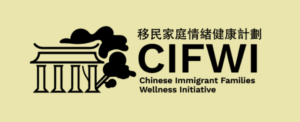
图片来源:CIFWI官网
Photo credits to CIFWI official website
在采访中,记者深深地感到亚裔美国人社群的心理问题需要提请更多关注,面对亚裔社群在心理问题上“传统观念”的藩篱,和现实中相关资源的缺乏,很多人正在为改善这种状况做出积极的努力。
During the interview, we felt strongly that the psychological problems of the Asian American community merit more attention and additional resources. We were pleased to learn that the groups and consortiums described above are advancing the ecosystem for the community.
正如卡斯蒂略所说,“我亲身体验了心理健康的巨大力量,看到它是如何改善个人和家庭”,“这种力量将驱使我继续在我们的社区组织更多活动。”
As Castillo puts it,“I experienced firsthand the power of having better mental health and how it can transform families. The passion continued to drive me to do community organizing.”
我们相信,在不久的将来,温暖的阳光会照进每一个角落。心若向阳,必生温暖。
In the future, we hope that sunlight illuminates the dark corners that remain in this area.

